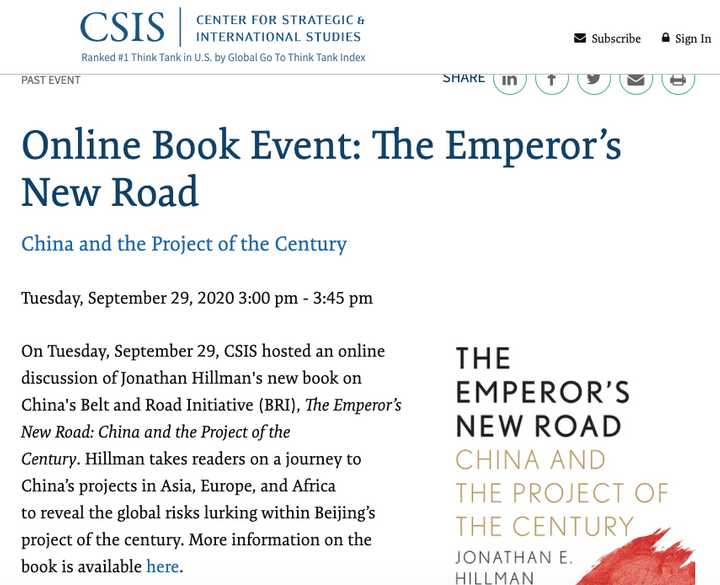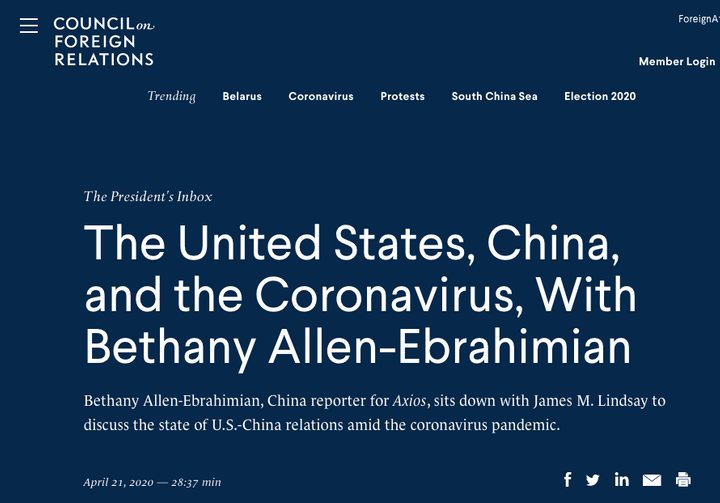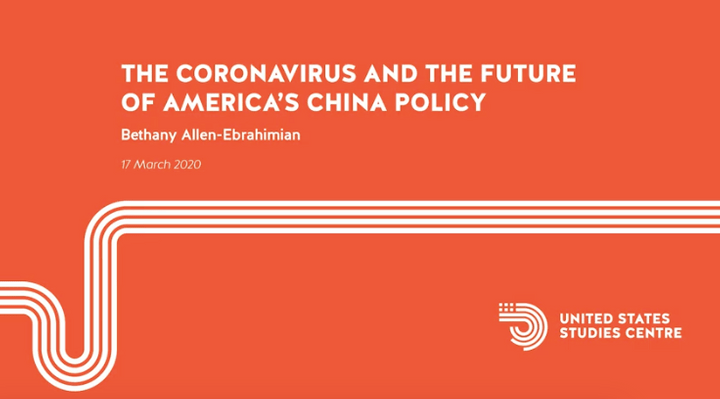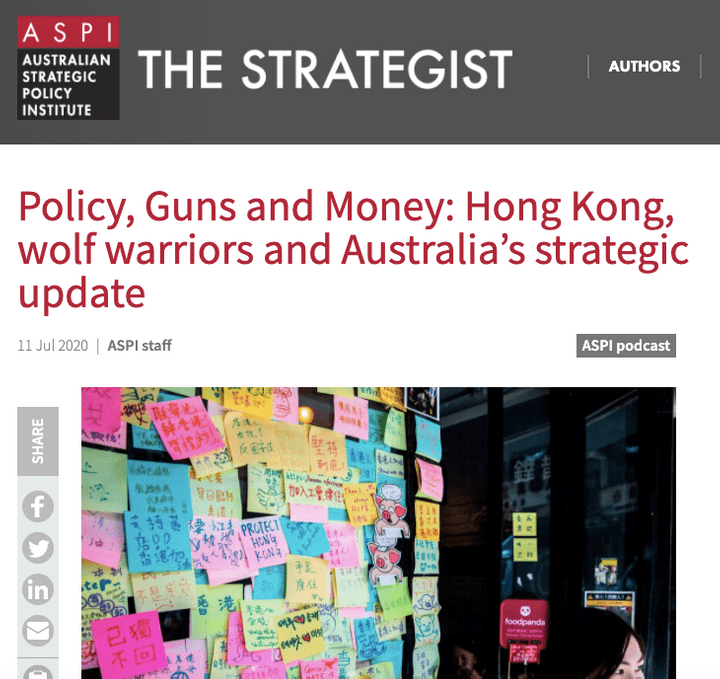

Bethany Allen-Ebrahimian
China Reporter, Axios
- About
- Book: Beijing Rules
- China's Power & Influence
- ICIJ's China Cables
- Recent Appearances
- Dispatches
- Features
- Profiles
- Analysis & Argument
- Satire
- Contact
About Bethany Allen-Ebrahimian
I am the China reporter at Axios, where I write high-impact investigations, scoops, and analysis about China, with a focus on how China projects power and influence beyond its own borders. I am deeply sourced in government agencies related to foreign policy and national security in the U.S., Europe, Taiwan and several other East Asian countries. I am based in Taipei, Taiwan.
I am the author of the book Beijing Rules: How China Weaponized Its Economy to Confront the World (HarperCollins), listed by the Financial Times as one of the best business books of 2023.My scoops & investigations have driven national debate and influenced US policy. In June 2020, I broke the story about Zoom suspending the accounts of U.S.-based activists after they held events commemorating Tiananmen; after my reporting, the DoJ opened an investigation and issued a criminal complaint against a Zoom employee who was allegedly working with China's intelligence services. In December 2020, a colleague and I published an extensive investigation into a suspected Chinese intelligence operative in California who had developed close ties to Rep. Eric Swalwell. The story eventually resulted in Swalwell's expulsion by Republicans from the House Intelligence Committee.
In 2023 I received a reporting grant from the Pulitzer Center for Crisis Reporting to fund a series at Axios called "China's Shadow Empires," which included reporting trips to Tanzania, Okinawa and Micronesia.
A small sampling of other scoops I have published:
- In November 2021, I published a data-based investigation revealing that Airbnb hosts rentals in Xinjiang located on land owned by a paramilitary group sanctioned by the U.S. The listings expose Airbnb to regulatory risk under U.S. law. Republican and Democratic lawmakers have since written letters to AirBnb urging it to delist those rentals.
- In December 2020, a colleague and I published an extensive investigation into a suspected Chinese intelligence operative in California who had developed close ties to the office of Rep. Eric Swalwell — a story which became a major national controversy and dominated headlines for weeks, and which resulted in a failed Republican attempt to remove Swalwell from the House Intelligence Committee.
- In July 2020, I broke the story about how China's consulate in San Francisco had spent the past 6 weeks secretly harboring a Chinese military researcher wanted by the FBI.
- In June 2020, I broke the story about Zoom suspending the accounts of U.S.-based activists after they held events commemorating Tiananmen, resulting in calls from Congress for greater accountability in the U.S. tech sector. After my report, the U.S. Department of Justice opened an investigation into Zoom, which resulted in a ground-breaking indictment of a Zoom employee based in China who had been secretly working with China's Ministry of State Security to shut down global speech on Zoom.
- In May 2020, I obtained a Chinese government extradition request sent to the Turkish government targeting a Uighur man who had fled Xinjiang after helping send information about police abuses to the outside world. Though Uighurs abroad have long suspected that China was approaching host governments with requests to deport Uighurs, this was the first such extradition document to ever be made public.
- In January 2020, through the examination of Chinese-language court documents, I discovered that a University of Minnesota student had been arrested and served 6 months in a Chinese jail for criticizing Xi Jinping in Twitter posts written while the student was in the U.S. — the first time that a Chinese student abroad has been convicted and jailed back in China for social media posts written while abroad, a troubling instance of extraterritoriality.
Other major stories I have published over the past few years:
- My Foreign Policy colleague James Palmer and I broke the story about China threatening U.S. airlines over Taiwan, a major story with global ramifications that prompted a statement by the White House.
- I was the first journalist to write about the exit bans the Chinese government is increasingly using to hold American citizens “hostage” as a form of political coercion.
- I've broken numerous major stories about China's growing influence at the World Bank, including an investigation revealing that China tried to get the World Bank to fund surveillance in Xinjiang.
- I was also the first to report on Huawei’s attempt to gain a security clearance in the Czech Republic, which would allow it to bid on a NATO ally’s sensitive infrastructure contracts.
I’ve also published numerous exclusives about veiled Chinese Communist Party-linked funding given to U.S. universities and think tanks, as well as lobbying in Washington.
Before joining Axios, I served as the lead reporter for the International Consortium of Investigative Journalists' China Cables project, a major leak of classified Chinese government documents revealing the inner workings of mass internment camps in Xinjiang. For my work on the China Cables project, I received the Robert D. G. Lewis Watchdog Award, the top prize awarded annually by the Society of Professional Journalists DC Dateline Awards, as well as the Investigative Journalism prize in the online category. The China Cables project was also a finalist for the Batten Medal for Courage in Journalism.
I am a sought-after speaker on China's global power and influence. I've been invited to speak at CSIS, the Council on Foreign Relations, Atlantic Council, Asia Society, German Marshall Fund, Center for a New American Security, Harvard, Yale, Columbia, Stanford, Tufts, Georgetown, and in India, Canada, and Taiwan.
I was previously a staff editor and contributing reporter at Foreign Policy magazine, where I wrote investigations, deeply reported narratives, and analysis related to China.
I covered the 2017 German federal elections as a correspondent in Berlin, writing for Foreign Policy and The Washington Post. I have reported from Russia, Germany, Austria, Turkey, China, Taiwan, Japan, and the World Economic Forum in Davos, Switzerland. I was a 2017 Arthur F. Burns Fellow in Germany and a 2016 Jefferson Fellow at the East-West Center.
My writing has also appeared in The New York Times, The Washington Post, and The Atlantic, and I have appeared as a guest on NPR, CNN, C-SPAN, the BBC, PRI, Al Jazeera, ABC Radio, and elsewhere.
I previously lived in China for four years. I hold a masters degree in East Asian studies from Yale University and a graduate certificate from the Johns Hopkins SAIS-Nanjing Center. I speak and read Chinese fluently.
You can reach me at bethany AT axios dot com.
Read my work at Axios here.
And at Foreign Policy here.
And at The Daily Beast here.
And for The Atlantic here.
BEIJING RULES
Press kit and how to buy
My new book Beijing Rules: How China Weaponized Its Economy to Confront the World publishes on...Scoops & investigations on
China's power projection abroad
Axios. June 24, 2021. In April, at least seven people in China who work in partnership with U.S. labor investigations firms Verité were interrogated by Chinese authorities for several days, several people familiar with the matter told Axios.
Amid threats and harassment, it's becoming increasingly difficult to verify whether products from China are tainted.
Axios. June 5, 2021. I obtained a written agreement revealing a $5 million grant from the China-United States Exchange Foundation (CUSEF) to the Bush China Foundation, established in 2017 with the former president's blessing. CUSEF is a policy and lobbying group registered as a foreign agent under FARA that is pushes Beijing's narrative in Washington.
Axios. March 23, 2021. The U.S. should consider leading a multilateral coalition with South American nations to push back against China's illegal fishing and trade practices, the Office of Intelligence and Analysis, an agency within the Department of Homeland Security, has recommended in a document obtained by Axios.
Investigation: Suspected Chinese spy targeted California politicians
Axios. Dec. 7, 2020. A suspected Chinese intelligence operative developed extensive ties with local and national politicians, including Rep. Eric Swalwell, in what U.S. officials believe was a political intelligence operation run by China’s main civilian spy agency between 2011 and 2015.
Axios. Oct. 6, 2020. A high-ranking German official suppressed a sensitive intelligence report in 2018 on China’s growing influence in Germany out of fear it would damage business ties with China.
Axios. July 22, 2020. Through carefully examining newly released court documents, I was the first to report that the Chinese consulate in San Francisco was suspected of harboring a Chinese military researcher wanted by the FBI for visa fraud. This was a major story that was picked up and featured on the homepage of mainstream news outlets across the U.S. Two days after this media blitz, the Chinese researcher left the consulate to attend a medical appointment and was arrested by U.S law enforcement.
This event was a major inflection point in the deterioration of U.S.-China relations. Consular involvement in research theft was one key stated reason for the July closure of China's consulate in Houston.
Axios. June 10, 2020. I broke the story about Zoom's suspension of several accounts of Chinese activists in the U.S. and Hong Kong, sparking an international outcry over China's influence over U.S. tech companies and freedom of speech. This was a major story that was picked up and featured on the homepage of mainstream news outlets across the U.S. It sparked weeks of national discussion and debate, including congressional calls for greater transparency and accountability in the U.S. tech sector.
Axios. Feb. 12, 2020. In May 2019, the FBI's Foreign Influence Task Force quietly added a unit aimed at countering China's political influence in the United States. In an exclusive interview with Axios, an FBI official reveals for the first time the bureau's approach to countering China's interference in local and state politics.
Axios. Jan. 30, 2020. The U.S. State Department has placed U.S. diplomatic staff and their families in China on "authorized departure," meaning they are permitted to leave the country amid the coronavirus outbreak. Axios broke this story.
Axios. Jan. 23, 2020. A Chinese student at the University of Minnesota was arrested in China and sentenced to six months in prison for tweets he posted while in the United States, according to a Chinese court document viewed by Axios. Some of the tweets contained images deemed to be unflattering portrayals of a "national leader." Tweets identified by Axios showed images of a cartoon villain with a likeness to Xi Jinping.
This story marked the first known case of a Chinese student at an American university being arrested and formally jailed in China for comments posted on social media only accessible outside of China -- a significant expansion of jurisdiction for Chinese courts.
Axios. Dec. 13, 2019. The World Bank told current and prospective employees of Taiwanese nationality they must present Chinese travel documents in order to maintain or pursue employment.
Axios. Dec. 11, 2019. Chinese recipients of World Bank loans tried to secure funding for the purchase of facial recognition technology for use in China’s northwest region of Xinjiang, according to official World Bank procurement documents obtained by Axios. Read those documents here.
The Washington Post. Oct. 29, 2019. I obtained a recording of a HikVision conference call with former U.S. Senator David Vitter, now a lobbyist working to get the U.S. government to drop export restrictions on HikVision, a Chinese video surveillance company on the Federal Entities list due to its complicity in human rights abuses in Xinjiang.
Foreign Policy. Aug. 27, 2019. A school supported by the $50 million loan purchased barbed wire, gas launchers, and body armor. I also obtained an email from a World Bank whistleblower who had filed concerns about the World Bank loan program in Xinjiang; their concerns had been ignored.
After I published this article, the World Bank launched a comprehensive review of the loan program, and in the end canceled part of it.
The Atlantic. May 14, 2019. Pro-China protests ahead of the 2008 Beijing Olympics were orchestrated by Chinese officials. The world thought they were a spontaneous showing of Chinese nationalism.
Foreign Policy. March 12, 2019. A scandal that started with massage parlors may tie into Beijing's plans.
Investigation: Chinese Police Are Spying on Uighurs in America
The Daily Beast. August 14, 2018. China is compiling a global registry of its ethnic minorities who have fled persecution, threatening to detain the families of those who don’t comply. The message: Nowhere is safe.
My reporting on this issue was later confirmed through the release of ICIJ's China Cables, which revealed the Chinese government directive sent out to public security bureaus around Xinjiang in June 2017, ordering local police to gather detailed information about all Uighurs living abroad.
The Daily Beast. Aug. 1, 2018. The U.S. has closed its doors to Huawei over fears that it’s a stalking horse for surveillance. So now Beijing’s communications giant is planting a flag in the Czech Republic.
The Daily Beast. July 25, 2018. The former secretary of state pushed one president to use China to isolate the Soviet Union. These days, he’s counseling almost the reverse—and officials are listening.
The Daily Beast. June 18, 2018. Exit bans are a new tool in China’s global coercion campaign.
This was the first article to reveal the existence of China's exit bans used against U.S. citizens. Since its publication, The New York Times and other publications have traced several stories of individuals and families affected by exit bans.
Foreign Policy. April 27, 2018. An FP colleague and I broke the story about China threatening U.S. airlines to refer to Taiwan as part of China--a major global story that resulted in a White House statement, which referred to China's demand as the now-famous phrase "Orwellian nonsense." This was a huge story with ramifications that echoed for months.
Investigation: China's Long Arm Reaches into American Campuses
Foreign Policy. March 7, 2018. Beijing is stepping up efforts to inject party ideology into student life. Some Chinese students are crying foul.
This was an influential investigation that proved definitively and for the first time that China's embassies and consulates fund and provide political directives to Chinese Students and Scholars Associations. This piece has been cited in numerous government and think tank reports; university groups have used the piece as a guideline to understand the CSSAs on their own campuses; and Chinese students and activists cite the piece when they want civil societies in democratic countries to understand the pressures they face to stay silence even outside of China.
ICIJ's China Cables
I served as lead reporter for the China Cables project at the International Consortium of Investigative Journalists (ICIJ).

The International Consortium of Investigative Journalists, Nov. 24, 2019. A new leak of highly classified Chinese government documents reveals the operations manual for running the mass detention camps in Xinjiang and exposed the mechanics of the region’s system of mass surveillance.
Dec. 12, 2019. We’ve learned a lot about China’s mass internment camps since the first English reports were published in 2017. But there are still plenty of unanswered questions.
Recent appearances
Talks, lectures, panel discussions, and more.

Foreign Correspondents Club of Hong Kong
October 5, 2020. I joined a panel discussing the latest controversy over Disney's Mulan, and why and how Beijing wants to influence the American film industry. Watch here.

Center for Strategic & International Studies (CSIS)
September 29, 2020. I led a discussion with CSIS senior fellow Jonathan Hillman about his new book "The Emperor’s New Road: China and the Project of the Century," about China's Belt and Road Initiative. Watch here.

Stanford University, Human Rights Foundation, and the Hoover Institution
Sept. 29, 2020. I spoke on a panel about China and digital authoritarianism, with opening remarks by Condoleezza Rice. This event was presented in partnership with Stanford University’s Global Digital Policy Incubator, the Hoover Institution, and the Stanford Institute for Human-Centered Artificial Intelligence.

Center for a New American Security
May 7, 2020. I spoke on a panel, alongside Francesco Bechis and Laura Rosenberger, about China's online disinformation and digital influence operations. Watch here.

The United States, China, and the Coronavirus
Council on Foreign Relations
April 21, 2020. I saw down with CFR director of studies James M. Lindsay to discuss the state of U.S.-China relations amid the coronavirus pandemic. Listen to the podcast here.

The Coronavirus and the Future of America's China Policy
United States Study Centre, Sydney, Australia
March 17, 2020. I gave a talk about US policy towards China amid the coronavirus pandemic, hosted by USSC at the University of Sydney. Watch here.

Hong Kong, wolf warriors and Australia's strategic update
Australian Strategic Policy Institute (ASPI)
July 11, 2020. I spoke with ASPI's "Policy, Guns, and Money" podcast about China's new wolf warrior diplomacy. Listen here.
Dispatches
From China, Taiwan, Japan, Russia, Germany, and Davos, Switzerland.
Axios. Jan. 25, 2020. DAVOS -- For much of the past 70 years, the behavior of Western companies has been shaped by Western laws and regulations, and by the vagaries of Western markets. Now China is the first non-Western, authoritarian country with both the market size and the will to reshape the behavior of multinational companies, and even Western governments, to better fit its own interests.
Washington Post, Sept. 15, 2017. BERLIN -- Germans are worried sick about the far-right AfD joining their parliament. Here's why you should be too.
Foreign Policy, Sep. 25, 2017. BERLIN -- But that could actually be a good thing, ending “too much consensus.”
Foreign Policy, Aug. 21, 2017. BERLIN -- Answer: The fascists have to get creative. My dispatch from a massive Nazi march on the outskirts of Berlin.
Foreign Policy, Aug. 16, 2017. BERLIN -- Crowds chanted “Nazi scum go away” and collected donations for victims of the violence.
ChinaFile, Sep. 23, 2017. BERLIN -- Epoch Times Deutschland appears to have ridden the wave of right-wing outrage sweeping Europe.
Foreign Policy, Sep. 18, 2017. BERLIN -- Once a uniquely American political cult, now the LaRouche movement can't get enough of Beijing.
New York Times. Dec. 7, 2016. TAIPEI -- I interviewed Taiwanese President Tsai Ing-wen just days after her controversial phone call with U.S. President-elect Donald Trump.
Foreign Policy. Aug. 5, 2016. TOKYO -- For the hawkish new governor of Asia’s biggest city, fighting for female empowerment was a necessity, not a calling.
Foreign Policy. May 26, 2016. BEIJING -- The evidence is strong that construction has devastated coral reefs. But Beijing claims no harm done.
Features
The Atlantic. Jan. 11, 2020. Academic institutions must grapple with the question of when engagement becomes complicity.
Foreign Policy. March 8, 2019. A relentless war on free spaces for Chinese exiles stems from past revolutions.
Foreign Policy. Oct. 25, 2017. The Communist Party wants to blame Hollywood and "loose women" instead of acknowledging its own epidemic levels of sexual assault.
Foreign Policy. Dec. 1, 2016. Can the trendy invocation of God’s will survive the coming wave of American Islamophobia?
Profiles
Foreign Policy
April 17, 2018. MOSCOW -- A former senior Russian intelligence official has created an American tech firm that pays people to go places and film things.
Foreign Policy
October 11, 2017. VIENNA -- Nobody knows if 31-year-old Sebastian Kurz is an establishment conservative or a far-right populist — and that’s why he’ll soon be running Austria.Foreign Policy
Aug. 5, 2016. TOKYO -- For the hawkish new governor of Asia’s biggest city, fighting for female empowerment was a necessity, not a calling.
Foreign Policy
June 29, 2016. Westerners said the web could never be controlled. Lu Wei, China's departing internet czar, proved them all wrong.
Analysis & Argument
Foreign Policy
Oct. 23, 2019. A kid's movie has turned into a geopolitical nightmare for DreamWorks.
The Washington Post
Dec. 12, 2017. The media should stop giving conservative Christians a pass when their non-factual claims influence elections.
The Washington Post
Sept. 16, 2017. BERLIN -- An inside look at how Bundestag members and staffers are maneuvering behind the scenes to reduce AfD influence before the elections.
The Washington Post
Feb. 9, 2017.
The Washington Post
Dec. 23, 2016. When Americans sing carols about the ‘Little Town of Bethlehem’ this Christmas, they should keep in mind who lives there.
Satire
Lighter takes on serious issues
Foreign Policy. July 3, 2016. A colonial Remainer on why the Declaration of Independence was a huge mistake.
McSweeneys. (Remember, friends, this is satire!)
Contact Bethany
Email Bethany at bethany.allen AT protonmail dot com, or use the form below.
Copyright 2015







